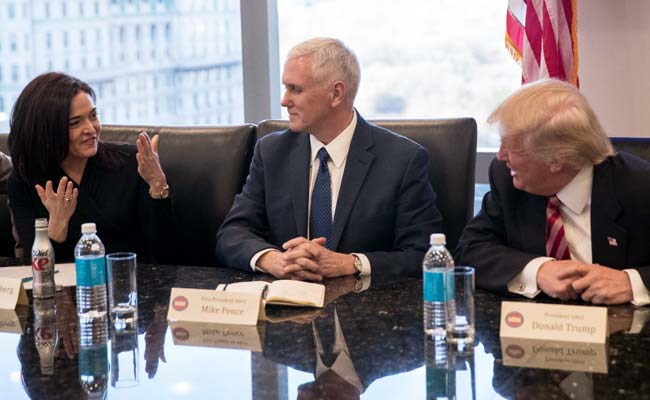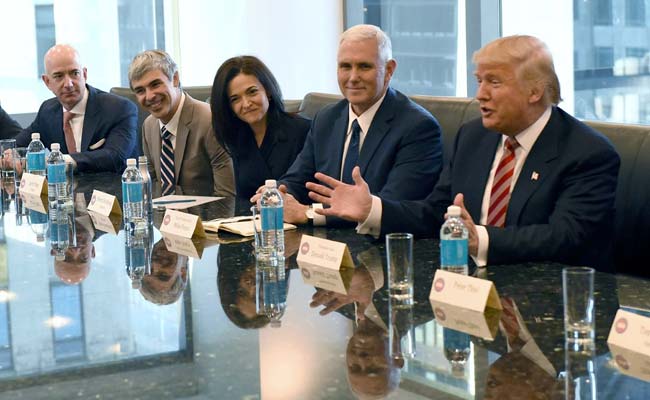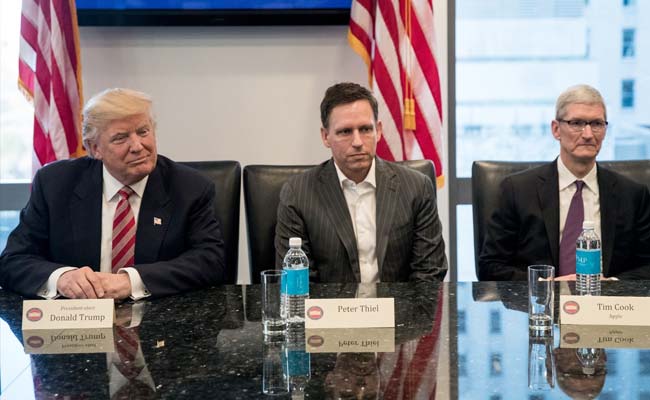
President-elect Donald Trump held a meeting on Dec. 14 with some of Silicon Valley's biggest companies.
New York:
A dozen or so technology executives filed into a conference room on the 25th floor of Trump Tower Wednesday wearing suits not usually seen in Silicon Valley.
Their combined net worth - at least $136 billion - was gilded even for the likes of Trump Tower. After months of acrimony that at times felt personal, they had come to make nice with the president-elect.
And make nice they did.
As they went around the room introducing themselves one-by-one, Amazon chief executive Jeff Bezos, once the target of President-elect Donald Trump's attacks, said he was "super-excited to talk about innovation in this administration." (Bezos is the owner of The Washington Post). Facebook Chief Operating Officer Sheryl Sandberg was also "excited to talk about jobs."
Donald Trump also was on his best behavior during the roughly two-hour meeting.
"This is a truly amazing group of people," he said. "There's nobody like you in the world. In the world. There's nobody like the people in this room. And anything we can do to help this go along, and we're going to be there for you."
But behind the cordiality was a sense of trepidation. Trump, both as candidate and president-elect, has used his perch to shame companies, and the consequences haven't been trivial.
When Trump tweeted earlier this month that he wanted to cancel Boeing's $4 billion contract to build Air Force One, Boeing's stock price took a hit.
Trump has targeted Apple and other companies for manufacturing their products in China, and has called to raise tariffs on Chinese goods, a crucial issue for Silicon Valley companies that import widgets and other hardware components from China.
 At the meeting, which included the leaders of Google, Microsoft, Intel, Oracle, IBM, Cisco, and Tesla, Trump seemed willing to back down from a signature campaign promise to end free trade deals.
At the meeting, which included the leaders of Google, Microsoft, Intel, Oracle, IBM, Cisco, and Tesla, Trump seemed willing to back down from a signature campaign promise to end free trade deals.
"We're going to make fair trade deals," he told the executives. "We're going to make it a lot easier for you to trade across borders."
Last month, Trump negotiated with equipment maker Carrier, a division of United Technologies, to avoid losing 800 jobs to Mexico in exchange for $7 million in government subsidies. In the days leading up to the meeting, staff for the companies tried to parse whether the image-conscious Trump would try to use his leverage with them to do something similar.
 After the CEO roundtable, Trump met privately with Tesla CEO Elon Musk and Apple CEO Tim Cook. Tesla manufactures its vehicles in California but purchases components from China. Apple hardware largely comes from China.
After the CEO roundtable, Trump met privately with Tesla CEO Elon Musk and Apple CEO Tim Cook. Tesla manufactures its vehicles in California but purchases components from China. Apple hardware largely comes from China.
Attendees had a wide-ranging and generally positive conversation, discussing issues from visas for high-skilled immigrants to trade issues to the cloud, according to people familiar with the discussion.
Trump made cracking down on illegal immigration a central campaign promise, and called for an end to the high-skilled visa program during a presidential debate, though he later backtracked. Technology companies are some of the heaviest users of such visas.
 At the meeting, Trump seemed open to keeping the high-skilled visa program, a person familiar with the discussion said.
At the meeting, Trump seemed open to keeping the high-skilled visa program, a person familiar with the discussion said.
The president-elect also heaped praise on Facebook board and transition team member Peter Thiel, shaking his hand and calling him a "special guy."
Trump made a point of saying that Thiel, who convened the meeting, nixed companies that were too small from attending. But one relatively small company with ties to Thiel made the cut: Palantir. Unlike the other companies in attendance, the data-mining start-up, which Thiel founded in 2004, is private and had revenue last year of less than $300 million, according to a person familiar with the matter. A large portion of Palantir's business involves contracts with federal agencies, and the company is currently engaged in a lawsuit with the Department of Defense over the right to compete for more contracts.
The executives left as they arrived - wordlessly and quickly, striding through the lobby and ignoring press questions. Some smiled; Oracle's Catz flashed a brief thumbs-up when asked how the meeting went.
(This story has not been edited by NDTV staff and is auto-generated from a syndicated feed.)
Their combined net worth - at least $136 billion - was gilded even for the likes of Trump Tower. After months of acrimony that at times felt personal, they had come to make nice with the president-elect.
And make nice they did.
As they went around the room introducing themselves one-by-one, Amazon chief executive Jeff Bezos, once the target of President-elect Donald Trump's attacks, said he was "super-excited to talk about innovation in this administration." (Bezos is the owner of The Washington Post). Facebook Chief Operating Officer Sheryl Sandberg was also "excited to talk about jobs."
Donald Trump also was on his best behavior during the roughly two-hour meeting.
"This is a truly amazing group of people," he said. "There's nobody like you in the world. In the world. There's nobody like the people in this room. And anything we can do to help this go along, and we're going to be there for you."
But behind the cordiality was a sense of trepidation. Trump, both as candidate and president-elect, has used his perch to shame companies, and the consequences haven't been trivial.
When Trump tweeted earlier this month that he wanted to cancel Boeing's $4 billion contract to build Air Force One, Boeing's stock price took a hit.
Trump has targeted Apple and other companies for manufacturing their products in China, and has called to raise tariffs on Chinese goods, a crucial issue for Silicon Valley companies that import widgets and other hardware components from China.

Sheryl Sandberg, Facebook COO, Mike Pence and Donald Trump during the meeting.
"We're going to make fair trade deals," he told the executives. "We're going to make it a lot easier for you to trade across borders."
Last month, Trump negotiated with equipment maker Carrier, a division of United Technologies, to avoid losing 800 jobs to Mexico in exchange for $7 million in government subsidies. In the days leading up to the meeting, staff for the companies tried to parse whether the image-conscious Trump would try to use his leverage with them to do something similar.

Trump meeting the top tech executives -- including several of his sharpest critics.
Attendees had a wide-ranging and generally positive conversation, discussing issues from visas for high-skilled immigrants to trade issues to the cloud, according to people familiar with the discussion.
Trump made cracking down on illegal immigration a central campaign promise, and called for an end to the high-skilled visa program during a presidential debate, though he later backtracked. Technology companies are some of the heaviest users of such visas.

Donald Trump had a two-hour meeting with top tech executives.
The president-elect also heaped praise on Facebook board and transition team member Peter Thiel, shaking his hand and calling him a "special guy."
Trump made a point of saying that Thiel, who convened the meeting, nixed companies that were too small from attending. But one relatively small company with ties to Thiel made the cut: Palantir. Unlike the other companies in attendance, the data-mining start-up, which Thiel founded in 2004, is private and had revenue last year of less than $300 million, according to a person familiar with the matter. A large portion of Palantir's business involves contracts with federal agencies, and the company is currently engaged in a lawsuit with the Department of Defense over the right to compete for more contracts.
The executives left as they arrived - wordlessly and quickly, striding through the lobby and ignoring press questions. Some smiled; Oracle's Catz flashed a brief thumbs-up when asked how the meeting went.
(This story has not been edited by NDTV staff and is auto-generated from a syndicated feed.)
Track Latest News Live on NDTV.com and get news updates from India and around the world

